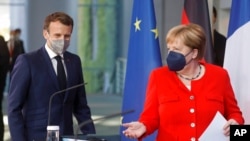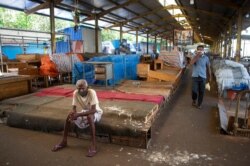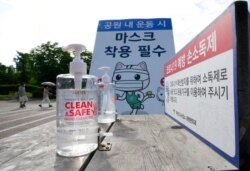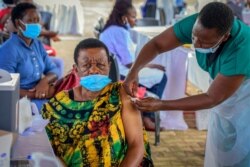German Chancellor Angela Merkel and French President Emmanuel Macron urged European Union countries Friday to be vigilant against the spread of new coronavirus variants and called for the bloc to coordinate its COVID-19 border reopening policies.
"Caution is still necessary so that we have a summer of many freedoms, if not all freedoms," Merkel told a joint news conference in Berlin before the two leaders held a working dinner.
"Some countries have reopened their borders earlier for tourist industry reasons, but we must be careful not to reimport new variants," Macron said.
Macron noted the situation in Britain while Merkel pointed to Portugal to show how things can quickly change.
Britain this week delayed a relaxation of pandemic restrictions because of the prevalence of the delta variant, which was first identified in India, while Portuguese authorities on Thursday banned travel in and out of the capital, Lisbon, because of the variant.
In other developments Friday:
— The delta variant was detected in Sri Lanka, a neighbor to India.
"It is the worst we could have imagined at such a time," Dr. Chandima Jeewandara, director of the Allergy, Immunity and Cell Biology Unit at Sri Jayewardenepura University, told The Hindu newspaper. "We are already dealing with a spike in cases with the alpha variant. Delta poses a greater risk because our vaccine coverage is low, and among those who are vaccinated a majority have got only one dose."
According to the Johns Hopkins University Coronavirus Resource Center, Sri Lanka, a nation of about 22 million people, has more than 235,000 COVID-19 cases.
— Israel's new government, sworn in Sunday, said it would transfer up to 1.4 million doses of soon-to-expire Pfizer coronavirus vaccine to the Palestinian Authority in exchange for about the same number of doses the authority expects to receive later this year. The Palestinian Authority canceled the deal later, however. PA Health Minister Mai Alkaila told reporters that the expiration date for the vaccine was in June, which would not give the Palestinian government enough time to use the doses.
Israel has been criticized for not sharing vaccine with the more than 4 million Palestinians in the occupied West Bank and Gaza Strip.
— In South Korea, a delay in the delivery of COVID-19 vaccines has pushed the government to offer its residents mixed doses. People who received the AstraZeneca vaccine as a first dose will now be offered the Pfizer vaccine for the second.
— A panel of health care experts said India would likely experience a third surge of coronavirus cases in October. "It will be more controlled" than previous surges because some people have been inoculated, said Dr. Randeep Guleria, director of the All India Institute of Medical Sciences.
India reported more than 62,000 new COVID-19 cases in the previous 24-hour period. The nation also reported 1,587 COVID-19 deaths, the country's lowest death toll in 60 days.
— Uganda's government announced that it was tightening lockdown measures to stop a rise in coronavirus cases. Public and private vehicles are banned on roads except for those vehicles carrying cargo, essential workers or the sick.
— In the United States, President Joe Biden announced that 300 million COVID-19 vaccine doses had been administered in the United States since he took office January 20.
But Biden's plan to have 70% of Americans at least partially vaccinated by Independence Day, July 4, may fall short because of a sharp decline in the number of vaccinations that began about two months ago.
Vice President Kamala Harris visited the southeastern city of Atlanta, Georgia, to encourage people to get vaccinated against the coronavirus.
About 36% of Georgians have been vaccinated, a rate lower than those of most other U.S. states.
— Canada's government announced that border restrictions on nonessential travel with the United States would be extended until July 21.
By late Friday evening EDT, Johns Hopkins had recorded 177.8 million global COVID-19 cases. The U.S. led the world in the number of cases, with 33.5 million, followed by India with 29.8 million and Brazil with 17.8 million.
Worldwide deaths from the disease have topped 3.8 million, Johns Hopkins said, and 2.5 billion vaccine doses have been administered.








